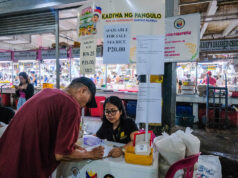SALARY accounts are viewed as a potential channel for broadening financial inclusion by discouraging employees from paying cash wages, thereby helping workers develop a banking history.
The Department of Labor and Employment (DoLE) become the latest agency to take part in the financial inclusion steering committee led by the Bangko Sentral ng Pilipinas (BSP) and declared its intent to help workers, especially those in the agricultural sector, gain access to formal banking services.
“In 2017, there were only 23% of adults in the Philippines with formal bank accounts. The Global Findex Report further reveals that in 2017 only 6.6% of private sector wage earners receive their salaries through a formal account,” Labor Assistant Secretary Benjo S. Benavidez said in his speech at the Financial Inclusion Forum for the Labor Sector held at the BSP on Monday.
“These figures tell us about the status of our financial inclusion, which means that only a small percentage of our alliance advances to financial services. We have a situation where a prevailing mode of payment of wages is through manual cash disbursements,” he added.
Central Bank Governor Benjamin E. Diokno said that formal accounts can also benefit employers.
“When employers pay salaries directly to the account of their workers through PESONet, it can potentially lower administrative and overhead costs, and reduce risks associated with cash distributions during paydays,” he said in his closing remarks at the event.
PESONet is one of the automated clearing houses (ACHs) set up under the BSP’s National Retail Payments System which is responsible for all interbank fund transfer instructions and credits a specific amount to the receiver by the end of the banking day it was sent.
So far, 51 banks were involved in PESONet as of June and more are expected to join, according to Vicente T. de Villa III, BSP Managing Director for the Financial Technology sub-sector. He added however, that in the end, it is a “business decision” for banks to take part.
“To be part of the NRPS, a bank should have an electronic banking license (which) is an added authority… to the usual banking license because there are other prudential aspects to being able to transact digitally. So those that have generally passed our scrutiny, can apply for PESONET… it’s a business decision on their end,” he told reporters on the sidelines of the forum.
Mr. Benavidez said DoLE will promote payment of wages through formal accounts.
“Formal accounts translate to easy access to financial products, including savings, credit, insurance, and investment. Studies also show that having a formal account encourages savings and therefore workers become more resilient in times of unexpected financial shocks,” he said.
He also cited other countries with similar initiatives.
“For instance, in Thailand, the government requires payment of wages of fisheries workers through electronic bank transfers. This ensures transparency and helps address forced labor and abuses in the fishing industry,” Mr. Benavidez said.
“The Qatar government implemented a similar initiative in order to resolve payments or late payment of wages of migrant workers in the construction industry,” he added.
Meanwhile, BSP Managing Director Pia Bernadette Roman-Tayag said that beyond having formal accounts, Filipinos are also hindered by some requirements for opening accounts, such as minimum balances.
She added that the BSP’s Financial Inclusion Survey in 2017 found that 50% of those who responded said they saved. Of those, 70% save at home and not in formal financial institutions.
“Pag nasa bahay lang, puwedeng mawala, pwedeng magastos or madalas makuhanan (Savings kept at home can be lost or spent easily),” she said.
Ms. Roman-Tayag said the Financial Inclusion Survey 2017 found that 69% of unbanked Filipinos said that they have insufficient money to open an account while 53% of unbanked respondents said it was expensive to open an account. — Luz Wendy T. Noble



